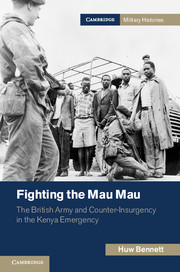Book contents
- Frontmatter
- Contents
- Maps
- Abbreviations
- Acknowledgements
- Introduction
- 1 ‘A determined campaign against the terrorist bands’
- 2 ‘Harmonious relations’: soldiers, civilians and committees
- 3 ‘Possibly restrictive to the operations’: marginalising international law in colonial rebellions
- 4 ‘The degree of force necessary’: British traditions in countering colonial rebellions
- 5 ‘Restraint backed by good discipline’
- 6 ‘A dead man cannot talk’: the need for restraint
- 7 ‘A lot of indiscriminate shooting’: military repression before Erskine's arrival
- 8 ‘Severe repressive measures’: the army under Erskine
- 9 ‘An essential part of the campaign’: civil-military alliances
- Conclusion
- Bibliography
- Index
5 - ‘Restraint backed by good discipline’
Published online by Cambridge University Press: 05 December 2012
- Frontmatter
- Contents
- Maps
- Abbreviations
- Acknowledgements
- Introduction
- 1 ‘A determined campaign against the terrorist bands’
- 2 ‘Harmonious relations’: soldiers, civilians and committees
- 3 ‘Possibly restrictive to the operations’: marginalising international law in colonial rebellions
- 4 ‘The degree of force necessary’: British traditions in countering colonial rebellions
- 5 ‘Restraint backed by good discipline’
- 6 ‘A dead man cannot talk’: the need for restraint
- 7 ‘A lot of indiscriminate shooting’: military repression before Erskine's arrival
- 8 ‘Severe repressive measures’: the army under Erskine
- 9 ‘An essential part of the campaign’: civil-military alliances
- Conclusion
- Bibliography
- Index
Summary
Given the tendency to meet colonial rebellions with exemplary force, and international law's silence on the matter, British policy could have resulted in genocide. It has been claimed that the strategy pursued in Kenya amounted to genocide. But there is no evidence for either an intention to eliminate the Kikuyu or that efforts were made to destroy the entire group. With its available forces, the army could have killed a far greater number of people. Massive retaliatory measures by artillery or aerial bombardment were avoided when forces were available for pursuing these options. In all, the evidence is insufficient to entirely jettison minimum force in explaining army behaviour in Kenya.
British military strategy in Kenya contained aspects of restraint from the beginning of the Emergency. The most significant restrained policies were the creation of legally defined zones with distinct engagement rules, initiatives to take prisoners, the fair treatment of prisoners and the use of special forces. These policies are assessed in chapter 6; here the aim is to show how they rested upon the army's ability to maintain internal discipline despite much provocation. Crime exists in all societies, including the armed forces, so the occurrence of some atrocities in the campaign against the Mau Mau should come as no surprise. What is more important is how the army dealt with these offences, trying to maintain a well-behaved force. In the sections of this chapter, a detailed account is given of how the army in Kenya attempted to maintain restraint by exercising its traditional disciplinary functions. Through public announcements, orders, meetings, inquiries and courts-martial, GHQ managed to restrain soldiers from running amok. In short, the army in Kenya upheld a higher disciplinary standard than local forces such as the Home Guard and KPR.
- Type
- Chapter
- Information
- Fighting the Mau MauThe British Army and Counter-Insurgency in the Kenya Emergency, pp. 108 - 127Publisher: Cambridge University PressPrint publication year: 2012



